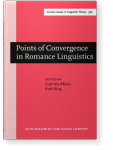Chapter 6
Same EPP, different null subject type
It is commonly assumed that all languages with Extended Projection Principle (EPP) type X will have null subject language (NSL) type Y, and vice versa (see Holmberg 2005, inter alia). We argue that although EPP type and NSL type interact, they are not co-extensive. We demonstrate that General Spanish, Brazilian Portuguese, and French have different NSL types (consistent, partial, and non-NSLs, respectively), but share the same EPP type (DP EPP). We also argue that both Brazilian Portuguese and Dominican Spanish underwent a change in EPP type, followed by the loss of agreement and a change in NSL type. Crucially, EPP type and NSL type did not change simultaneously. It therefore follows that EPP and NSL type cannot be co-extensive.
Article outline
- 1.Introduction
- 1.1Background on the EPP
- 1.2Background on NSLs
- 2.Different NSL type, same EPP
- 2.1Consistent vs partial NSL types
- 2.1.1Portuguese
- 2.1.2Spanish
- 2.2EPP type
- 2.2.1French
- 2.2.2General Spanish
- 2.2.3Brazilian Portuguese
- 3.Synchronic and diachronic variation
- 3.1Diachronic variation
- 3.1.1Goiás BP
- 3.1.2Dominican Spanish
- 3.2Synchronic variation
- 4.Conclusion
-
Acknowledgements
-
Notes
-
Abbreviations
-
References
